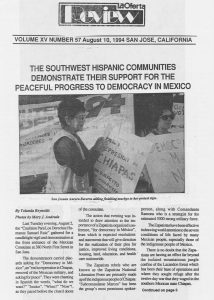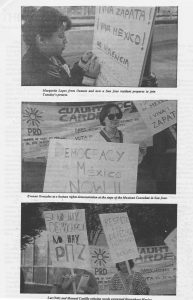August 10, 1994
By Yolanda Reynolds
Photos by May J. Andrade

Last Tuesday evening, August 2, the “Coalition Para Ios Derechos Humanos Samuel Ruiz” gathered for a candlelight vigil and demonstration at the front entrance of the Mexican Consulate at 380 North First Street in San Jose.
The demonstrators carried placards sting for “Democracy in Mexico”, an “end to repression in Chiapas, removal of the Mexican military and asking for peace.” They were chanting in Spanish the words, “what do we want?” “Justice”. “When?” “Now!” as they paced before the closed doors of the consulate.
The action that evening was intended to draw attention to the importance of a Zapatista organized conference, “for democracy in Mexico,” from which is expected resolutions and statements that will give direction for the realization of their plea for justice, improved living conditions, housing, land, education, and health care nationwide.
The Zapatista rebels who are known as the Zapatista National Liberation Front are primarily made upon the indigenous people of Chiapas. “Subcomandante Marcos” has been the group’s most prominent spokesperson, along with Comandante Ramona who is a strategist for the estimated 5000 strong military force.
The Zapatistas have been effective in drawing world attention to the severe conditions of life faced by many Mexican people, especially those of the indigenous people of Mexico.
There is no doubt that the Zapatistas are having an effect far beyond the isolated mountainous jungle confine of the Lacandon forest which has been their base of operations and where they sought refuge after the twelve day war that they waged in the southern Mexican state of Chiapas.
Almost in unison, the three top presidential candidates have been promising major governmental reforms. The PRI candidate, Ernesto Zedillo whose party has controlled Mexico for over 60 years, now says that he will end the centralized control of government in Mexico.
Zedillo explains that State governments and local government will no longer have to turn to Los Pinos (Mexico’s White House) for permission on matters within their jurisdiction. He also promises that the August 21 election will be fraud free. Zedillo further promises that he will increase social spending and cut taxes.
This is a dramatic shift from the the PRI’s previous emphasis on economic development, the successful passage of NAFTA, and the reversal of Constitutional legislation inspired by the Mexican Revolution of 1910.

PAN candidate Diego Cevallos whose party is considered more business oriented and critical of excessive governmental control, had already advocated a greater degree of local control, thus making more accountable for their decisions. Cevallos demands the end of corruption responding to a claim made, by many that corruption exists at all levels of government.
The PAN party has been in existence almost as long as the PRI has existed. PAN candidates have won governorships, legislative positions and numerous lessor political offices. PAN is especially strong in the northern states of Mexico that border the United States.
The PRD, the other leading opposition party, was framed in 1988 after its leading spokesperson, Cuauhtemoc Cárdenas, was overlooked by the PRI leadership for their presidential candidate.
He and his colleagues say that they want to improve the economic conditions of the Mexican worker through improved union representation (one free of government influence), the “enactment of antitrust laws, greater public investment and land ownership rights” for the campesino.
Cardenas. who ran under the the banner of the newly formed PRD party, was believed by many people to be the actual winner of the 1988 presidential election. Cardenas and the PRD are considered to be less pro-business and more concerned with fulfillment of the agreements enacted into Constitutional Law following the 1910 Mexican Revolution.
The moment at which Mexico’s route to the future will be decided is fast approaching. 0n August 21 many eyes and ears will be focused on Mexico. This worldwide attention is giving hope to many Mexican citizens that this election might be fraud free and that whoever wins the election will follow through with their promises. These include social and economic justice, and end to corruption, a greater attention to quality of life issues not the least of which is the serious environmental degradation that is occurring all over Mexico, access to education beyond the elementary grades, affordable housing and land for farming.
In the state of Chiapas it is reported that 2% of the population controls 95% of the state’s resources. The poor community is predominately indigenous, but many mestizos share that status.
Antonio Reymundo, a San Josean and one of the demonstrators who was at the San Jose Mexican consulate, says of the PRI, “they are trying to buy the people… they will make many promises and once they are sure of a vote they go to the next voter with their promises.” He and others are skeptical that the PRI, will not attempt to go beyond such manipulation. They are hoping that both national and international observers and close scrutiny will allow for change without violence.”
Numerous U.S. residents of Mexican citizenship have traveled to Mexico in order to participate in this year’s presidential elections. Evonne Gonzales, a Hayward resident and PRD supporter, attended the Zapatista Aguascalientes Democracy Conference and will also be serving as an election day observer. Gonzales, a mother and an attorney, says that her concern is that every child in Mexico have the benefits that her child has here in the electronics industry.
Gonzales adds, “Mexico’s future will be based on the success with which we educate our children… we cannot afford to waste talent.”
The talent and intelligence of those children was exemplified for this writer in the manner in which a small group of Chamulan girls caught my attention as we walked through the village square. The oldest, who said she was 9, was so quick, spoke Spanish well- though it was obvious from her accent that it was not her first language. She and four other younger friends had not gone to school – there was none. She had to learn Spanish on her own. She was impressive for her perceptive
abilities and sophistication. I could imagine her someday the Governor of Chiapas- if she had half a chance.
Some correspondents have characterized the Conference in Chiapas as a “political love in.” That characterization denies the deadly seriousness of the issues that confront Mexico and ultimately the stability of the Americas.
Contrary to a report in the local daily, Cecilia Rodriguez who was asked by subcomandante Marcos to serve as the Zapatista representative in the United States, is not head of the UFW (United Farm Workers), but rather a long-time community and human rights activist based in Texas.
Factual reports from Mexico are difficult to ascertain even when one is there. But since many people died in the January uprising it is evident that the Mexican government means to deal severely with the protesters by the presence of massive show of Mexican military might throughout the state of Chiapas.
Not only for Mexico but also for the U.S.A. it is imperative that the needs of all Mexicans be met with dispatch and that they have a say in how their country is run via the ballot box. © La Oferta Newspaper.
